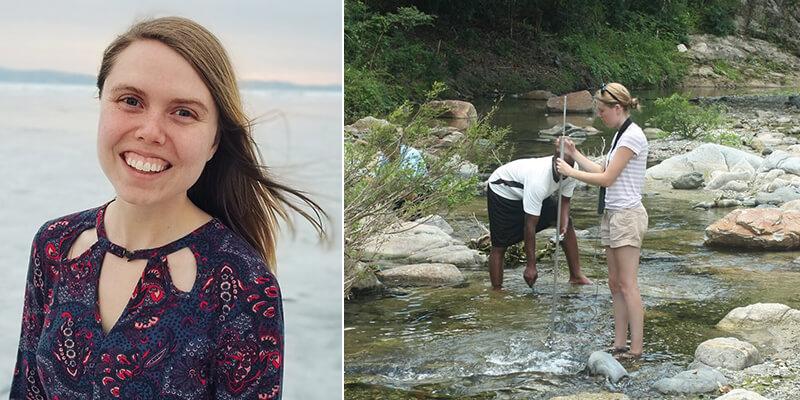Our featured student in the February 2020 issue of IMPACT is Mae Kate Campbell, a Master’s candidate in the Geology program within the College of Arts and Sciences.
IMPACT: Mae Kate, tell our readers where you are from and what you studied as an undergraduate student?
Mae Kate: I grew up in Annapolis, MD, near the Chesapeake Bay. Even as a little kid I always loved rocks and joked that I would be a geologist someday. I didn’t actually know you could be a geologist because I’d never met one! Growing up by the Bay made me aware of a lot of environmental challenges the region is facing, which made me want to help solve them. When I finally was able to take a geology class in college, I fell in love. To me, geology provides the perfect background for understanding and thinking of solutions to environmental issues. I think there’s a lot of power in taking a whole-earth systems perspective.
IMPACT: That’s a powerful story. What inspired you to go to graduate school at UVM?
Mae Kate: I studied abroad in Cuba as an undergraduate, so I knew what an amazing place it is and how inspiring the Cuban people are. While I was there, I didn’t have the opportunity to take any science classes, so I was definitely interested in learning more about Cuba from that perspective. After returning from Cuba, my undergraduate advisor told me that she and her collaborator at UVM, Dr. Paul Bierman, were interested in studying the relationship between changes in land use and erosion in Cuba, and she asked if I would be interested in completing a masters working on the project. I was excited by the idea of the research and of working with Dr. Bierman. It was the opportunity to complete the research project in Cuba that drew me to UVM, but beyond that I’ve really enjoyed my time here in Vermont!
IMPACT: We’re happy you came our way! Tell us about your experiences in grad school, and what it is like to work with faculty members and students in a research setting.
Mae Kate: One of the amazing things about working in the NSF/UVM Community Cosmogenic Facility is that scientists travel from around the country (and sometimes from around the world!) to process their samples here at UVM. The Cosmogenic Facility is a community lab that serves scientists working on diverse research questions that can be investigated using unique isotopes, such as measuring long-term erosion rates or determining when ice sheets retreated.
I’ve met so many other scientists working on all sorts of different research topics. It’s been cool to see the variety of research going on in my field and to be made aware of all the different opportunities out there. It’s been great to get to work closely with visitors, lab mates, and faculty both in the field and lab.
IMPACT: Tell our readers about the type of research you’re doing with Dr. Bierman and others in Cuba.
Mae Kate: We’re working in Cuba to understand how changes in land use affect erosion. Cuba used to practice high-input industrial agriculture, using synthetic fertilizers and heavy tractors imported from the Soviet Union to increase crop yields. After the Soviet Union collapsed, Cuba didn’t have the materials to keep farming the way they had been. They shifted to lower-impact agricultural strategies, such as using horse- or oxen-drawn plows and utilizing natural soil amendments like compost.
The research project overall is working to assess if this change in the way Cuba practices agriculture caused a reduction in erosion. My part of the project is looking at erosion over longer time scales, determining the “natural” rate of erosion so we can compare how the rate of erosion has changed over time. We traveled to Cuba to work with a team of Cuban scientists to collect river sand and water, which allows us to make erosion measurements.
IMPACT: That is very interesting and something that most Americans probably don’t know about. Are there faculty members in Grad School at UVM who have been particularly important to you, and why?
Mae Kate: Paul has been an awesome mentor and is always looking out for his students, thinking of opportunities that would be helpful for them and helping make connections that will be useful beyond grad school. He’s supported me in pursuing my interests beyond just the academic realm. I also want to acknowledge all the support I’ve gotten from Lee Corbett. Lee has been an incredible mentor and friend, and a comforting, steady presence throughout my graduate career.
IMPACT: Tell our readers where you are in your graduate education and what you plan to do after graduating.
Mae Kate: I am close to finishing up my degree and just started working part time at the Lake Champlain Basin Program as an environmental analyst. After I graduate, I will transition to working there full time. It’s nice to have a post-grad plan and I’m excited that I’ll get to use the skills I learned through studying geology and completing research to help address environmental issues right here in Lake Champlain.
IMPACT: Mae Kate, we thank you for your time and wish you the best of luck in your career!
